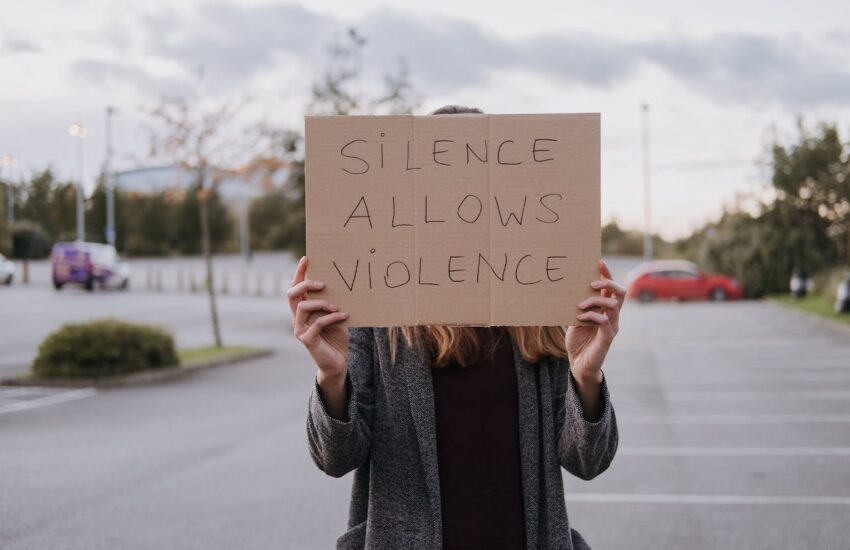In the realm of relationships, love should be a beacon of warmth and affection. It should nurture, uplift, and empower individuals to become their best selves. Unfortunately, not all relationships unfold this way. Some find themselves trapped in the clutches of abuse – a sinister force that tarnishes even the brightest aspects of life.
If you suspect someone you care about is entangled in an abusive relationship, your concern is both admirable and essential. Your support can make a world of difference for those who feel imprisoned by fear and manipulation. But where do you begin? How can you provide guidance without overstepping boundaries?
It provides you with valuable insight into abuse patterns, how to recognize its signs, and how to assist someone who has been abused. While navigating through available resources for victims seeking liberation, emotional support plays a crucial role.
Join us as we shed light on this delicate topic and unravel practical strategies to help those longing for freedom from toxic relationships. Together, let’s lend our voices against abuse while offering solace to survivors who deserve nothing less than love and compassion.
Understanding Abuse
Abuse takes many forms and can manifest in various ways within relationships. It is crucial to grasp the complexity of abuse, as it often extends beyond physical violence alone. While physical harm may be more apparent, emotional, verbal, psychological, and financial abuse are equally damaging.
Emotional abuse involves controlling behaviors aimed at undermining an individual’s sense of self-worth and autonomy. This can include constant criticism, humiliation, or manipulation designed to erode their confidence and independence. Verbal abuse entails using words as weapons to belittle or intimidate a person into submission.
Psychological abuse inflicts deep wounds on one’s mental well-being by creating fear through threats or instilling feelings of helplessness and isolation. Financial abuse occurs when someone misuses money or resources to exert control over their partner’s decisions.
It is important to remember that anyone can be a victim of abuse regardless of gender identity, sexual orientation, age, race, or socioeconomic status. By understanding these different aspects of abusive behavior, we become better equipped to recognize its presence in the lives of those around us.
Recognizing the Signs of Abuse
Abuse can manifest in various forms, and it’s crucial to be aware of the signs so that we can help those trapped in abusive relationships. While abuse is not always physical, it often leaves behind emotional scars that are just as damaging.
The abuser may isolate their victims from friends and family, controlling who they interact with and where they go.
Verbal abuse can also be a red flag. It can involve name-calling, insults, or constant criticism meant to belittle and undermine self-esteem. It may also involve constantly monitoring a partner’s activities or demanding access to personal accounts. Victims may feel worthless or believe that they deserve it.
Financial abuse is another tactic used by abusers to maintain power and control over their partners. They may restrict access to money or resources, making it difficult for victims to leave the relationship.
Physical violence is perhaps the most recognizable form of abuse. Bruises, broken bones, and other injuries should never be ignored or dismissed as accidents.
Sexual coercion is also a severe form of abuse that must not be overlooked. If someone feels pressured or forced into any sexual act against their will, it constitutes sexual assault within an abusive relationship.
It’s essential to remember that these signs do not always appear all at once; instead, they typically escalate over time. By familiarizing ourselves with these indicators early on, we can offer support before things worsen further.
By paying attention and recognizing the signs of abuse in others’ lives, we can become allies for those who need our help most desperately.

Steps to Take When Helping Someone in an Abusive Relationship
When you suspect that someone you care about is in an abusive relationship, it’s crucial to take steps to support them and help them find safety. Here are some important actions you can take:
1. Educate yourself: Learn more about the dynamics of abuse and how it affects victims. This knowledge will enable you to understand their experience better.
2. Approach with empathy: Initiate a conversation with compassion and non-judgmental language. Let them know that you are there for support whenever they feel ready to talk.
3. Listen without judgment: Give your undivided attention when they decide to open up about their situation. Validate their feelings and experiences, making sure not to blame or criticize them for staying in the relationship.
4. Offer resources: Share information on local organizations, helplines, shelters, or professionals who specialize in supporting survivors of abuse. Encourage them to seek professional help if they feel comfortable doing so.
5. Safety planning: Help create a safety plan tailored specifically for their situation – one that takes into account potential risks and ways to minimize harm during leaving or seeking help.
Remember, each individual’s journey is unique, so be patient and understanding throughout the process of helping someone in an abusive relationship.
Supporting the Person Emotionally and Physically
The importance of providing emotional and physical support to someone who is in an abusive relationship cannot be overstated. You can make a significant difference in their healing process by providing emotional support. Let them know you believe them and that they are not alone, and encourage open communication so they can express themselves freely.
Active listening is crucial when providing emotional support. It is important to let the person share their experiences at their own pace and validate their feelings throughout the conversation. Express empathy by acknowledging the hardships they have faced while remaining non-judgmental.
Offer practical assistance like accompanying them during legal proceedings or medical appointments if they feel comfortable having your presence there. Remember to respect boundaries and let the survivor lead the way when it comes to decisions about their own safety.
By providing both emotional and physical support, you’re creating a supportive environment where survivors feel empowered to take steps towards breaking free from abuse.
Resources Available for Victims and Survivors
When someone is in an abusive relationship, it’s crucial to provide them with information about the resources available to help them navigate their situation. There are numerous organizations and support networks dedicated to supporting victims of abuse.
One such resource is local domestic violence shelters or safe houses. These facilities offer temporary accommodation for those escaping abusive environments, providing a safe space where they can begin rebuilding their lives. They often provide counseling services, legal assistance, and access to community resources.
Additionally, helplines staffed by trained professionals are available 24/7 for anyone seeking immediate support or guidance. These helplines can offer crisis intervention, safety planning tips, and connect individuals with local services tailored to their specific needs.
Many communities also have nonprofit organizations focused on assisting survivors of abuse. These organizations may offer counseling programs, support groups, educational workshops on healthy relationships, and legal advocacy services.
Online resources are another valuable tool for victims and survivors. Websites such as The National Domestic Violence Hotline or Loveisrespect.org provide comprehensive information about different forms of abuse, steps to take when leaving an abusive relationship safely, and strategies for healing after trauma.
Remember that each person’s experience is unique; therefore it’s important to tailor the available resources based on individual circumstances. By empowering victims with knowledge about these resources, we can help guide them towards a path of safety and recovery.
Tips for Keeping Yourself Safe while Helping Others
Helping someone in an abusive relationship should always be a top priority for your safety. Here are some important tips to keep in mind:
1. Educate yourself: Understand how abuse works and be familiar with local resources for victims and survivors. By learning about the dynamics of abuse, you will be able to navigate the situation more effectively.
2. Set boundaries: It’s crucial to establish clear boundaries with the person you’re supporting. Let them know what you can and cannot do, and ensure they understand that their safety is ultimately their responsibility.
3. Maintain confidentiality: Respect the privacy of the survivor by keeping their information confidential unless there’s an immediate threat to their life or well-being.
4. Support and guidance can be provided by trusted friends, family, or professionals during this process.
5. Encourage the survivor to document incidents of abuse, including dates, times, locations, and any injuries sustained. This documentation may be helpful later.
6. Safety planning: Help the survivor develop a safety plan tailored to their unique circumstances. This might involve identifying safe places they can go or creating code words or signals for emergency situations.
Remember that every situation is different; these tips are meant as general guidelines but may not apply in all cases.
Conclusion: The Importance of Speaking out against Abuse and Supporting Victims
In a world where abuse is far too prevalent, it is crucial for us to speak out against it and support those who are trapped in abusive relationships. By understanding the dynamics of abuse, recognizing the signs, and taking appropriate steps to help someone in need, we can make a significant difference in their lives.
It’s important to remember that supporting someone emotionally and physically requires empathy, patience, and non-judgmental behavior. By offering a listening ear, providing resources and information about available support services, we empower survivors to take control of their own lives.
As responsible members of society, we must also educate ourselves on the various resources available for victims and survivors. Life coaches can play a vital role in helping individuals rebuild their self-esteem and confidence after leaving an abusive relationship. Additionally, there are numerous organizations dedicated to assisting victims with legal aid, counseling services, safe housing options, and more.
While helping others is commendable, it’s equally important to prioritize your own safety when dealing with potentially dangerous situations. Always exercise caution when intervening or confronting an abuser directly. Consult professionals or authorities if needed to ensure everyone’s well-being.
By actively speaking out against abuse and providing unwavering support for those affected by it – whether as friends or life coaches – we contribute towards breaking the cycle of violence. Together as a community working towards healthier relationships built on respect and love rather than power imbalances; we have the power to transform lives for the better.
Remember: Helping someone escape from an abusive relationship may just be what gives them newfound hope for a brighter future!



